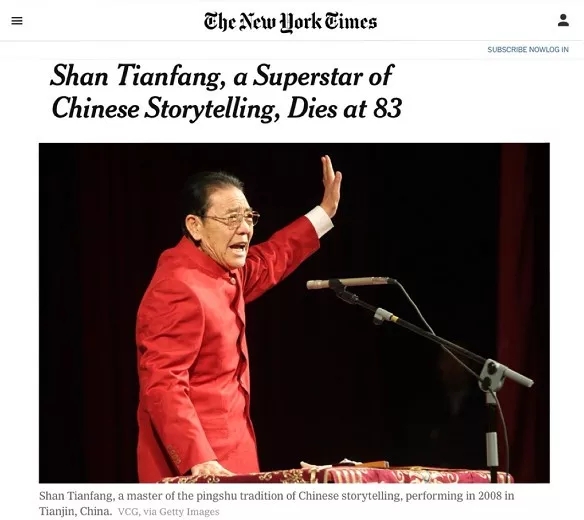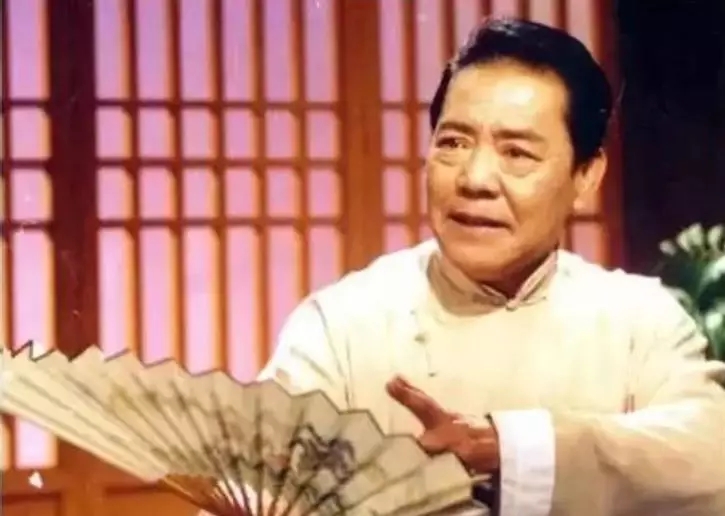“欲知后事如何,且听下回分解。”
一桌、一椅、一扇、一抚尺,评书表演艺术家单田芳讲述着一段段历史传奇,各方英雄好汉、乱世枭雄纷纷登场。
2018年9月11日,评书大师单田芳因病逝世。国内媒体报道、纪念单田芳的同时,美国《纽约时报》(The New York Times)也发布了长文讣告(obituary),回顾他作为说书人的一生,缅怀单田芳。

在文章开篇,《纽约时报》评价他:“将古老的评书传统推向现代,让几代中国人得以欣赏。”
Shan Tianfang, a storyteller whose energetic oral renditions of classical Chinese novels and historical events propelled the ancient pingshu tradition into the modern age for generations of Chinese, died on Sept. 11 in Beijing. He was 83.
说书人单田芳于9月11日在北京去世,享年83岁。他对中国古典小说和历史事件做出充满激情的演绎,将古老的评书传统推向现代,让几代中国人得以欣赏。
rendition n. 译文;演奏
早年时光:曾未想入此行
回顾单田芳的一生,文中写道:上世纪50年代,说书这一行业社会地位低下,出生于民间艺人家庭的单田芳并未想过走上这一行。
单田芳
Mr. Shan tried for many years to avoid becoming a performer of pingshu, the Song dynasty-era storytelling tradition. Growing up in 1950s China in a family of folk art performers, he had seen struggle firsthand. It was a life of constant financial troubles and low social status.
单田芳曾经并不希望成为这种源于宋代的故事讲说传统的表演者。他在20世纪50年代中国的一个民间艺人家庭长大,亲眼目睹了这一行的艰难。那是一种持续处于经济困境、社会地位低下的生活。
So it was with great reluctance when, out of financial necessity, he became an apprentice to a family friend who was a master of pingshu. He made his debut in 1956.
因此,当他出于生计上的需要,拜一个评书大师为师,他也是单田芳的家族朋友。当时单田芳非常不情愿,1956年,他首次登台演出。
评书是怎样的一种艺术形式呢?看《纽约时报》是如何描写的:
In the pingshu tradition, the performer wears a traditional gown and sits behind a desk equipped with a folding fan and a wooden block, which is used like a gavel. The storyteller recounts a legend — typically a classical Chinese epic — from memory, using different voices and exaggerated gestures as well as adding occasional background detail and commentary.
在评书传统中,表演者身着传统的长袍,坐在桌子后面。桌上有一把折扇和一个作醒木之用的木块。说书人讲述通常来自中国古典史诗的传奇故事。他们根据记忆来表演,使用不同的声音、夸张的手势,偶尔还加入背景细节和评论。
即便入行时并不情愿,但后来,他渐渐地爱上了这一行。
更难能可贵的是,他精益求精。
单田芳仔细钻研,研究历史,在古典史诗中发现的历史错误、迷信幻想,他都能基于自己的研究进行纠正,并用独树一帜的风格进行诠释:
Mr. Shan grew to love the storytelling form, which is popular across northern China. It is a demanding profession that combines acting, oration, writing, historical research and literary criticism and requires countless hours of memorization.
单田芳渐渐喜欢上了这种在中国北方流行的讲故事方式。这是一个要求很高的职业,集表演、演说、写作、历史研究和文学评论于一体,需要记忆无数个小时的材料。
But bothered by what he felt were the many historical inaccuracies and superstitious fantasies found in the classical epics, Mr. Shan, who had studied history, soon began performing his own interpretations based on his meticulous historical research.
不过,在古典史诗中发现的许多历史错误和迷信幻想令单田芳感到烦恼。基于自己对历史的研究,他很快就开始用自己的诠释和理解进行表演。
有了这样的基础,在东北地区的许多茶馆里,他以对经典的新颖演绎而闻名。

广播时代:声名鹊起
文革时期,单田芳说书的工作一度中断,文革结束以后,随着时代发展,单田芳发现传统的茶社说书形式已经不能满足观众的需要。
机缘巧合之下,单田芳得到了通过广播电台说书的机会。但他却发现,录音室里和在茶社不同,没有道具,也看不到听书人的反应。
他是如何做的呢?
So for his first radio performance, an abridged version of the historical novel “The Romance of Sui and Tang Dynasties,” Mr. Shan used the studio’s three recording technicians as his audience and adjusted his performance based on their reactions.
因此,在他的第一次广播演出——节略版的历史小说《隋唐演义》中,单田芳用了演播室三名录音师作为观众,根据他们的反应对自己的表演进行调整。
借助广播的力量,这次评书有1亿多中国观众收听,单田芳声名鹊起:
The performance had its premiere in 1980 on Chinese New Year, and more than 100 million Chinese were estimated to have tuned in during the 56 hours over which it was broadcast. It was the beginning of a dramatic second act both for Mr. Shan and for pingshu in the People’s Republic of China. He was soon a household name across the country.
这次表演于1980年在中国农历新年首播,在播出的56个小时里,估计有超过1亿中国观众收听。对于单田芳和中国评书来说,这都标志着戏剧性的第二春的开始。他很快在全国家喻户晓。
后来,单田芳为广播和电视录制了大量的评书故事,《纽约时报》列出了一串让人惊叹的数字:
Over six decades, Mr. Shan recorded more than 110 stories for radio and television totaling about 12,000 episodes and spanning 6,000 hours. His best-known works include his renditions of Chinese classics like “White-Eyebrow Hero” and “Sanxia Wuyi” and his dramatizations of historical figures like Zhuge Liang and Lin Zexu.
60多年来,单田芳为广播和电视录制了110多个故事,总共约12000集,时长6000小时。他最著名的作品包括对《白眉大侠》、《三侠五义》等中国经典名著的演绎,以及对诸葛亮、林则徐等历史人物的戏剧化改编。
时至今日,单田芳在中国仍旧广受观众欢迎:
Even today, hop into a Beijing taxi and the driver may be listening to one of Mr. Shan’s recordings.
即使在今天,如果你坐上一辆北京出租车,司机可能还是在听单田芳的录音。
《纽约时报》采访了一位48岁的出租车司机,他说,单田芳能把复杂故事简单化,听着“特别带劲儿”。
“For my generation, Shan Tianfang was a master,” said Zhao Fuwei, 48, a Beijing taxi driver. “If back then there was such thing as a viral star, then Shan Tianfang was definitely the hottest viral star.”
“对我们这代人来说,单田芳就是一个大师,”48岁的北京出租车司机赵福为(音)说,“过去是没有网红一说,要是像现在这样,那单老爷子准是网红。”
“Listening to his stories has made it easier to kill time in bad traffic,” Mr. Zhao added. “He was so good at making complicated historical stories simple and interesting. You feel like you could relate to the characters in his stories, even though they lived a long time ago.”
“北京这破路,堵死,听听书还舒服点,”赵先生接着说,“人家能把复杂故事简单化,听着特别带劲儿。虽然他讲的都是古人的事,但是你能感觉到自己和这些人物能产生共鸣。”
艺术人生
文章介绍说,单田芳出生于演艺世家。本梦想当一名医生,却由于家庭变故,接过了家里做表演行当的衣钵:
Shan Chuanzhong was born on Dec. 17, 1934, in Tianjin, China. His mother, Wang Xianggui, was a stage actress. His father, Shan Yongkui, was a folk musician who played the sanxian, a three-stringed Chinese lute.
单传忠(单田芳本名——译注)于1934年12月17日在中国天津出生。他的母亲王香桂是一名舞台演员。他的父亲单永魁则是一名民间音乐家,主要演奏一种名叫“三弦”的中国弹拨乐器。
Growing up, Mr. Shan and his four sisters frequently moved around northeastern China with their parents, an experience that left him longing for a more stable life and career. But in the early 1950s, when his parents divorced and his mother left the family, Mr. Shan gave up his dream of being a doctor and embraced his performance heritage.
在成长的过程中,单田芳和他的四个妹妹在中国东北地区频繁搬家。因为有着这样的一段经历,单田芳非常希望拥有一个稳定的生活和工作。但是,在20世纪50年代早期,他的父母离异,母亲离开了这个家。而从那以后,单田芳就放弃了当医生的梦想,接过了家里做表演行当的衣钵。
他先跟着一个评书师父做学徒,学成后加入了一个民间曲艺团。这个团体驻扎在鞍山,而在那时候,这个东北小镇正是一个以茶馆和评书闻名的地方。
文革期间,他的演艺生涯因此沉寂,而文革之后的20世纪80年代,单田芳享誉全国。
2007年,单田芳退休。在评书这种艺术形式已经逐渐成为“小众”的时代,他的事业仍在延续。《纽约时报》写道:
But in recent years many of the great pingshu performers have died, and the tradition is fading. By the time Mr. Shan retired in 2007, interest in pingshu among Chinese had all but been replaced by mobile phones and gaming.
然而近年来,许多优秀的评书人都相继去世,这一传统也在逐渐消失。到了2007年单田芳退休的时候,中国人对评书的兴趣已经被手机和游戏所取代。
Nevertheless, even after retiring, Mr. Shan worked tirelessly to promote pingshu among young Chinese, mentoring apprentices and starting a school dedicated to the folk arts.
然而,即使在退休后,单田芳也依然辛勤地工作,在中国年轻人当中推广评书、教导学徒,还办了一家民间艺术学校。
而对于生活中出现的新科技,单田芳始终抱着接纳的态度:
Ever willing to adapt to new technologies, he posted a message to his Sina Weibo microblog account on Sept. 6, five days before his death. It was an announcement about a new live-streamed lecture series about pingshu.
对于生活里出现的新科技,单田芳始终抱着接纳的态度。在他去世的前五天,也就是9月6日,他还在他的新浪微博账号上发送了一条消息。在那条微博里,他向大家宣布,他的线上评书公开课开讲了。
(来源:中国日报双语新闻编辑部)
